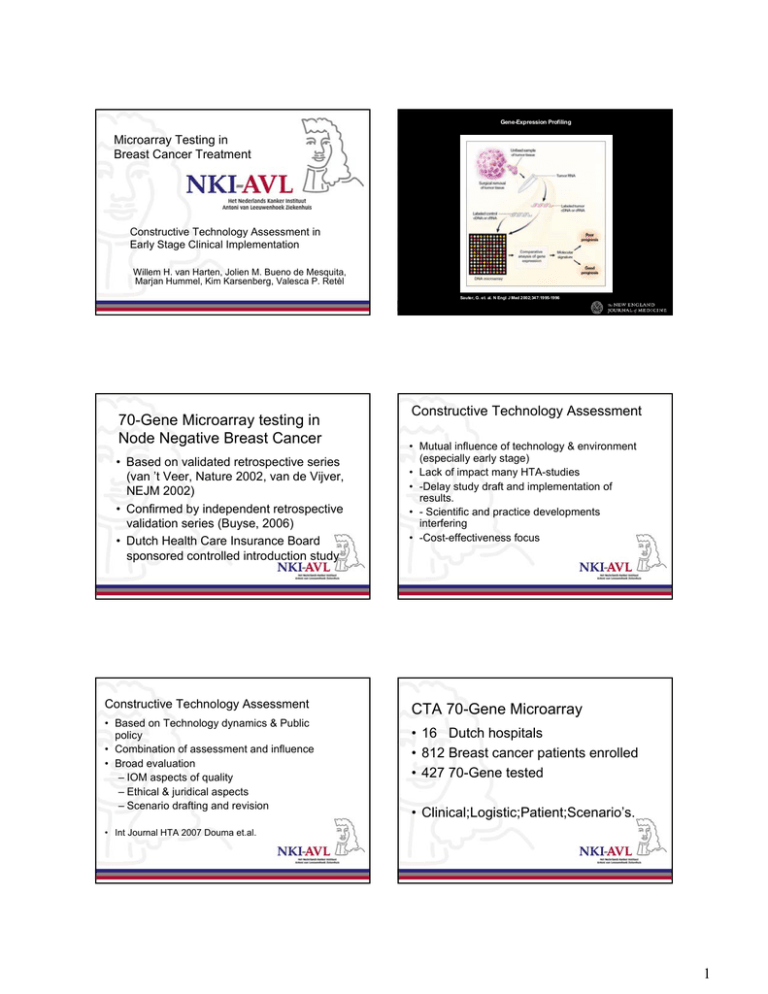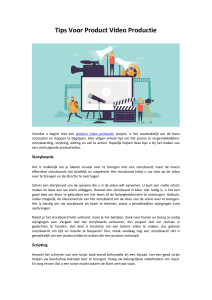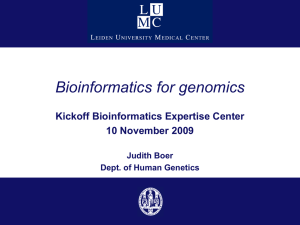70-Gene Microarray testing in Node Negative Breast Cancer Constructive Technology Assessment
advertisement

Gene-Expression Profiling Microarray Testing in Breast Cancer Treatment Constructive Technology Assessment in Early Stage Clinical Implementation Willem H. van Harten, Jolien M. Bueno de Mesquita, Marjan Hummel, Kim Karsenberg, Valesca P. Retèl Sauter, G. et. al. N Engl J Med 2002;347:1995-1996 70-Gene Microarray testing in Node Negative Breast Cancer • Based on validated retrospective series (van ’t Veer, Nature 2002, van de Vijver, NEJM 2002) • Confirmed by independent retrospective validation series (Buyse, 2006) • Dutch Health Care Insurance Board sponsored controlled introduction study Constructive Technology Assessment • Based on Technology dynamics & Public policy • Combination of assessment and influence • Broad evaluation – IOM aspects of quality – Ethical & juridical aspects – Scenario drafting and revision Constructive Technology Assessment • Mutual influence of technology & environment (especially early stage) • Lack of impact many HTA-studies • -Delay study draft and implementation of results. • - Scientific and practice developments interfering • -Cost-effectiveness focus CTA 70-Gene Microarray • 16 Dutch hospitals • 812 Breast cancer patients enrolled • 427 70-Gene tested • Clinical;Logistic;Patient;Scenario’s. • Int Journal HTA 2007 Douma et.al. 1 CTA 70-Gene Microarray Clinical Results N = 427 70-gene signature risk profile Low risk profile High risk profile CTA 70-Gene Microarray Clinical Results Total Clinical (CBO) profile Low risk 167 (39%) 76 (18%) 243 (57%) Clinical (CBO) profile High risk 52 (12%) 132 (31%) 184 (43%) 219 (51%) 208 (49%) 427 (100%) Total CTA 70-Gene Microarray Logistic Analysis • Change of work routine for ORtissue handling and Pathologist • Mean duration of implementation of logistics 2,2 months (0,2 – 9,4) after Review Board approval! CTA 70-Gene Microarray Patient Centeredness • 14% (partly) contradictory information • 10% dissatisfied with test communication (discordant!) • -54% informed treatment decision • -20% not informed. • -26% don’t know. In 19% of patients the adjuvant systemic treatment advice was changed based on the 70-gene signature profile: – in 5% the treating physician refrained from adjuvant systemic treatment – in 14% adjuvant systemic treatment was added CTA 70-Gene Microarray Patient Centeredness • Questionnaires (n = 49) based on taped pilot Patient Interviews. • -44% not clear about influence on treatment. • -32% aware of >50% chance of metastasis in high risk test result. • Impact of events scale; HSCL scale ; psychosocial well-being scale non conclusive CTA 70-Gene Microarray Two round scenario • Method: Shell based approach: TINA & “what-if”-deviations; Rogers phases. • Round One and Two: written draft with one round of professional comments…. • What if…. Debate on validity and alternative tests.. • What if…. Different reactions of insurance agencies projected. • Round Three: formally structured meeting with various professionals. 2 CTA 70-Gene Microarray Conclusions: CTA 70-Gene Microarray Future Implications • -Prolonged implementation due to logistic adaptations + complex technology. • -30% discordant results (NL majority low >high vs USA maj. high > low??) • -Risk communication/Informed decision making important issues, espec. in discordant cases. • Input for a large EU-trial (MINDACT) • Third Round Scenario Draft • Cost effectiveness: Modelling (scenario input) CTA 70-Gene Microarray Future Implications CTA 70-Gene Microarray • Controlled Introduction is feasible • CTA is a promising assessment method for technologies that are unstable or introduced in an early stage • Defensive behavior? • Juridical Ethical Issues (Patient Rights!) • Psychological impact Thanks to: Marc van de Vijver, Sabine Linn, Harm van Tinteren, Frits van Dam, Kirsten Douma, Laura van ‘t Veer Prof. dr. W.H van Harten Orlando, June 5, 2007 Microarray Testing in Breast Cancer Treatment Constructive Technology Assessment in Early Stage Clinical Implementation Willem H. van Harten, Jolien B.M. Bueno de Mesquita, Marjan Hummel, Kim Karsenberg, Valesca P. Retèl 3

